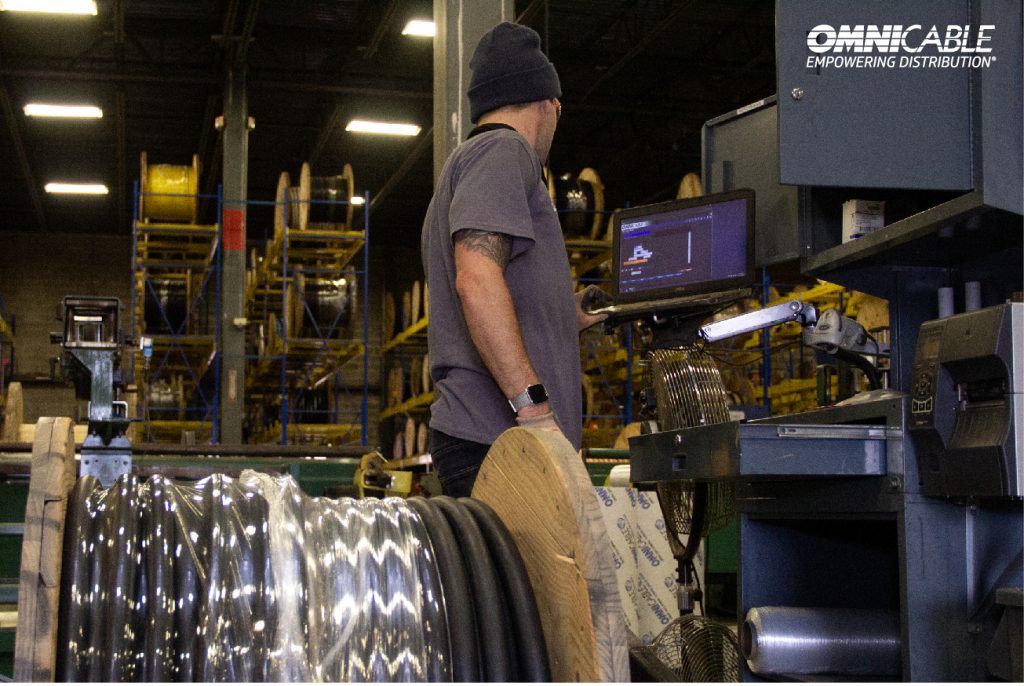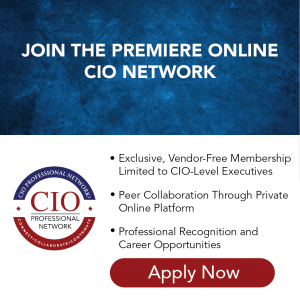With a 17 year career in the technology industry and with a newly acquired MBA from Wharton, Priya Serai accelerated into her first CIO role earlier this year. She serves as the Chief Information Officer for OmniCable, a premier redistributor of wire and cable, electrical products, and value-added services located in West Chester, Pennsylvania.
In this issue, Priya shared how the dot-com boom shaped her interest in technology, her career path, and the challenges of starting a new role in the C-Suite in the midst of a global pandemic. She walked us through the initiatives that she has overseen to date at OmniCable and what she sees on the horizon, and also shared her thoughts on women in technology.

Chief Information Officer
OmniCable
Walk us through your CIO path. How did you decide to pursue a career in technology, and how did you progress to your current organization?
I remember growing up, like many girls, I looked up to my father a lot, who is a business owner back in India. I remember watching him negotiate his business deals over the phone, and he would use these different tactics to get the job done with the limited resources he had. He always liked coming up with innovative ways to raise capital as an entrepreneur.
On the flip side, my mom is a homemaker, and she is a perfect complement to my dad. She taught me resilience, grit, and the importance of standing up for yourself with what you believe in.
My parents always inspired me to be a “self-made man,” but counseled me on the challenges of achieving that level of success while being a woman.
Later, when I was on the cusp of deciding my college major back in 2000, the dot-com bubble dominated the headlines. Watching this exciting time unfold is what drove me to pursue a degree in computer science and telecommunication.
After graduation, I started my career as a Java developer with a firm called Tata Consultancy Services, and GE Commercial Finance was my first client. The work was exciting, and I quickly realized that I loved coding, but I realized that understanding the implementation within a business and problem-solving context was really what excited me.
That’s when I decided to pivot, and I pursued various roles within the tech industry. From development to quality assurance to business analysis to project management, and so on. I believe this broad technology experience is what prepared me for the opportunity to manage and run a tech business group.
Despite this experience, however, I realized that I still needed that formal education in business and finance to continue advancing my career, and that’s what drove me to pursue my MBA at Wharton. Obviously with a ton of support from my husband and kids, I pursued that degree while working full-time with one of the fintech firms here in Philly, SEI. Then from there, I accepted my current role at OmniCable.
Would you consider yourself a CIO, a CTO, or a hybrid? Why?
If I’m introducing myself to someone, I typically don’t use my title. I say I’m a techno business professional with recyclable dreams.
What I mean by that is, I need to be flexible enough to dot the “I” in CIO and cross the “T” in CTO, regardless of what the title is. We all know that change is the only constant thing with technology, especially today.
Technology executives, regardless of what you call them, can’t afford to play a backseat role. If a company is really serious about their growth and revenue, they need their tech executives with them, strategizing and executing every step of the way.
For example, in a role like mine with OmniCable, we’re not selling any technology products – but the business applications that we have, or will soon have, internally are still quite important to running and growing the organization.
My title is obviously CIO, but I feel that the scope of the role goes beyond the title. OmniCable’s team has generally engaged me so far with every business decision that was made.
What initiatives have you overseen to date in your time with your current organization? What’s on the horizon?
It’s still been a brief time with OmniCable, but the top initiatives that I’m building right now focus on supply chain optimization.
For OmniCable’s industry, the supply chain is key to everything, and to support that supply chain, we need a strong business intelligence platform.
A good example is the healthcare industry during the pandemic. They’ve grown by leaps and bounds by innovatively improving their supply chain in a chaotic time. I’m trying to achieve a similar level of innovation within our industry.
With wires and cables, supply chain optimization presents a very unique challenge. Building applications using supplier and customer data to predict the cyclical nature of sales that we have within electrical distribution is another thing that will drive revenue growth.
How do you foresee your organization being different in two years, and how do you see yourself shaping that change?
Two years is still a short span to make big industry moves. I think realistically, being measurably more data-driven is something that’s achievable in two years. OmniCable’s business leaders have great tenure, great expertise, and experience in the electrical distribution space. I imagine that bringing that experience together with the power of artificial intelligence and machine learning will enable tremendous growth for our business.
What new or disruptive technology issues or emerging trends do you think will impact your industry in the future?
I’m drawing a lot of parallels with what I’m seeing in healthcare. There are so many innovative applications that can be used in the healthcare space, but they simply don’t due to regulations. My husband works in the healthcare industry, and we have a lot of dinner table conversations about this.
One topic we discuss, for example, is how many hospitals don’t talk to each other from a data standpoint. All the paperwork is still processed very manually, and there is very little in the way of automation.
I think there are similar issues with our industry when it comes to data integration. From a customer and supplier integration view, a lot of order placing is still manual and over the phone. That brings in a lot of inefficiencies with the ordering process and ultimately affects how well you deliver the product.
If we bring the right level of innovation to currently available technologies and bring in the right inter-digital experience between customers and suppliers, we will disrupt the electrical distribution industry.
Share your experience of starting a role of this magnitude in the midst of a pandemic. Has that created any specific challenges?
I do think there have been pros and cons, similar to what most of us have experienced working remotely. The thing that has helped me the most is that OmniCable has such great work force. Everyone has been very accommodating, super nice, and going those extra lengths to be flexible. That has absolutely been wonderful.
I think we are all just figuring out what makes sense to do in person versus what is fine to do remotely. I don’t think training and onboarding has been any issue, regardless of starting in a pandemic.
The bigger challenge is building relationships in a new organization while working remotely. That’s definitely harder to achieve over the phone.
Share your thoughts on the availability of IT talent. What strategies do you employ, and what’s different in your organization?
The talent challenge within IT has been discussed for probably over a decade now, and I think it’s more persistent than other fields because of the constantly changing technology landscape. Every day there’s something new, and there are so many fields within IT. It’s like a flavor of the month.
Additionally, you don’t just need talent that knows IT. You need groups of people who not only understand the tech, but they can also understand the business so that you can implement the right tech solution for the right business challenge. For all of those reasons, it only makes sense that we have a shortage of talent.
The typical strategy that I’ve employed with other companies, and I’m planning to utilize with OmniCable as well, is to build those right partnerships in the industry with various consulting and talent management groups so that you can flex with the type of talent you want.
What traits and attributes are essential for today’s CIO versus 10 to 20 years ago?
The answer is simple in my mind. The need to add value to the business and the bottom line today is the key difference. CIOs are now seen as business professionals, not just tech experts. Other than understanding your technology, you need to understand market trends and financials. Knowing the structure of the business is as important as understanding the technology trends.
And then there are so many fields within IT, it’s like the flavor of the month – cybersecurity, cloud, data, AI, mobile, IIOT and the list is endless. And you need talent who not only understands the tech but can also understand the business, to implement the right tech solutions for the right business challenges. It’s no wonder we have a shortage of talent because we are always looking for unicorns!
The short term strategy I’m employing with Omni is to build right partnerships in the industry with various consulting and talent management groups so that we can flex with the type of talent we want. Long term though, I would like to partner with neighboring schools and find ways to promote students to take more tech programs and educate them on the varied career paths within tech.
What advice would you give for someone who aspires to be a CIO?
I feel like to be a successful CIO, you need to differentiate from your competition. Learn to understand what the customer really wants, and then match it with that right technology solution.
I remember this Henry Ford quote. He said, “If I had asked people what they wanted, they would have said faster horses.” Don’t stop to do simply what others tell you to do. Think beyond that and don’t accept the status quo.
How do you decompress from the challenges of your current role? What do you do for fun?
There’s nothing like playing with your kids, right? At the end of a stressful day, especially in this pandemic, it’s been a boon working from home because you step out of your study and they just laugh endlessly at something so silly and so small. I feel like that is the best stress reliever of all, to watch them laugh and giggle.
I’m also a big TV and Netflix buff. I watch Netflix a lot. I watch a lot of web series. I just love catching up on my shows.
Who have been your biggest influences, and why?
We already covered some of them – my parents and my husband, but I feel like my biggest motivator has come from those who doubted me or told me I couldn’t do something. Those have been my biggest influencers.
It may again sound a little cliché if I say failure is the key to success, but I think that has worked for me. If I can’t achieve something or have been told I can’t achieve something, that is a big motivator for me to prove them, and myself, wrong.
Which books would you most recommend that others read?
There are tons. If I think about a couple that come top of my mind right now, The First 90 Days by Michael Watkins is one. I always read that. Whenever I switch a job or get into a new position within a company, I still go back to that book. I think it offers great advice on things to do and things not to do in your first 90 days in a new role.
The Startup Way by Eric Ries is a big one as well, especially in technology roles with all of the agile and lean principles that we use. It’s a great book.
From a motivation standpoint, Good to Great by James Collins is another one that I keep going back to. I remember a little excerpt from where Collins talks about this gentleman, Dave Scott, who won six Ironman triathlons, biked like 75 miles, swam thousands of meters, ran 17 miles a day – and yet coming back home, he would rinse his cottage cheese to get rid of that excess fat.
“Rinsing Cottage Cheese” is the name of the chapter that I always go back to whenever I’ve had a rough day. It’s not like that little extra fat helped Dave Scott to win Ironman, but the point is that that very small action showed his commitment, his discipline to be the best. That story always inspires me to think on, what does “rinsing my cottage cheese” look like for me in my pursuit of achieving something or being the best? That gives me the energy I need the next day to go and not give up.
If you weren’t doing the job that you have today, what would be your alternative dream job?
I think I’d be a doctor. I say that jokingly, but I ask my kids “What do you want to be when you grow up?” and obviously as a kid, I was asked, and I would always say “I want to be a doctor.” At some point I drifted away to engineering as opposed to medicine, but I do sometimes wonder what it would have been like if I had taken that path.
What would you want our readers to know that we haven’t covered?
One thing I’d like to add is regarding women in tech. I was, and still am, very grateful to have the support of my husband, Suraj. He’s always stood by me, motivating me to do more and realize my strengths to their fullest. However, from others, I was cautioned at several stages in my career, sometimes about being overambitious or sometimes that I was being unrealistic with my goals, especially after I had my kids.
I feel like there’s still this notion of what you can realistically achieve in order to balance your work and family life, especially if you’re a working mom. Yes, while it’s true and an everyday challenge for me to balance my kids’ needs and manage remote schooling with work meetings and communication these days, I’d like to say to my women readers that nothing is out of reach. You can still do it with a little more grit and maybe a tad more planning.
And to everyone else, support and promote women at your work and in your life. Motivate them to achieve their dreams.













